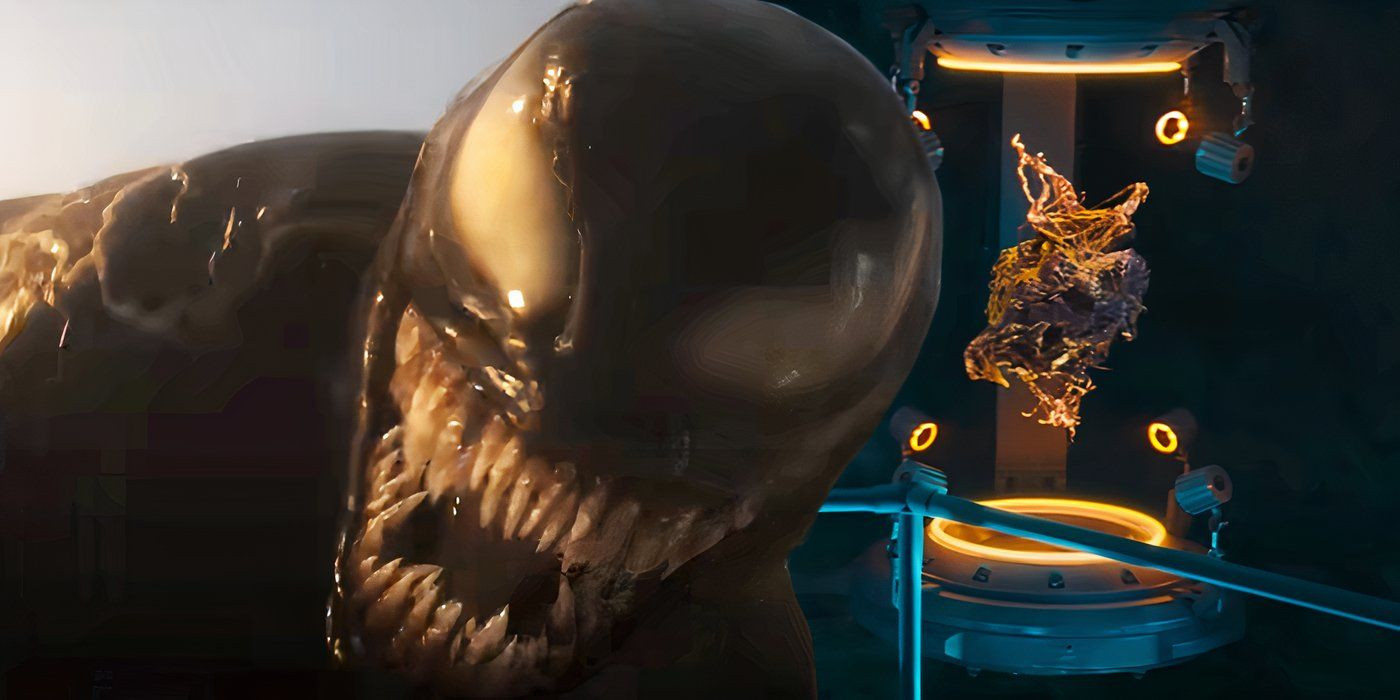The introduction of Knull in Venom: The Last Dance was initially met with immense excitement. As a cosmic entity of unparalleled power within the Marvel universe, Knull, the god of symbiotes, held the potential to redefine the landscape of Sony’s Spider-Man Universe (SSU). Trailers showcasing his menacing presence amplified the anticipation, and many, including myself, eagerly awaited to witness how Sony would handle such a formidable character. Director Kelly Marcel’s hints at Knull’s future appearances in the SSU further fueled this enthusiasm.
However, a sense of disappointment lingers, especially considering Venom: The Last Dance is seemingly the concluding chapter of Venom’s SSU trilogy. While Knull has clashed with numerous Marvel heroes in the comics, most of whom are under Marvel Studios’ banner and inaccessible to Sony, Venom stands as his primary adversary. This presented a peculiar scenario: Knull, poised to confront lesser-known characters like Morbius and Kraven the Hunter instead of the iconic Venom and Thor. Ultimately, this promising trajectory seems to have fizzled out, leaving a sense of unrealized potential.
Venom 3 Initially Positioned Knull as the SSU’s Thanos-Level Threat
The Post-Credit Scene Suggested Knull’s Return, But To What End?
Knull’s origins are deeply rooted in cosmic horror. He is the progenitor of all symbiotes, an ancient god dwelling in the abyssal void between universes. His godhood grants him powers that dwarf even many established Marvel movie villains. Knull’s power scale is such that he could rival Thanos, especially without the Infinity Gauntlet, in terms of sheer destructive potential. In Marvel Comics, Knull’s might is brutally illustrated by his act of tearing Sentry, Marvel’s equivalent to Superman, in half.
[
](/venom-3-villain-knull-powers-comics-explained/)
Related Article: Venom 3 Villain: Knull Powers & Comics History Explained
The approach Sony took with Knull’s introduction mirrored Marvel Studios’ strategy with Thanos. His role in Venom: The Last Dance was initially subtle, manipulating events from his Klyntar prison. This echoes Thanos’s shadowy presence in Guardians of the Galaxy, followed by a more explicit tease in Avengers: Age of Ultron, setting the stage for his devastating arrival in Avengers: Infinity War. The post-credits scene of Venom: The Last Dance, hinting at Knull’s looming threat to Earth, seemed to suggest a similar build-up. However, the latest developments cast doubt on whether this setup will ever pay off.
Kraven the Hunter’s Performance Casts a Shadow Over the SSU’s Future
Reports Indicate a Potential Halt to Sony’s Live-Action Spinoff Development
Recent reports from The Wrap suggest a significant shift in Sony’s strategy, indicating a potential pause in the development of live-action Spider-Man Universe spinoff movies “for now.” The studio is reportedly pivoting towards its successful animated Spider-Verse franchise, the upcoming Spider-Noir series, and its collaborative projects with Marvel Studios on Spider-Man. This news surfaced amidst unfavorable early reviews for Kraven the Hunter, which appears to be another setback for Sony’s cinematic universe aspirations. An anonymous Sony insider reportedly admitted, “The movies just aren’t good,” a sentiment echoed by critical reception to Kraven the Hunter.
| Sony’s Spider-Man Universe Movies | Worldwide Box Office | Rotten Tomatoes Critics Score |
|---|---|---|
| Venom (2018) | $856,081,053 | 30% |
| Venom: Let There Be Carnage (2021) | $501,546,922 | 57% |
| Morbius (2022) | $162,759,437 | 15% |
| Madame Web (2024) | $100,298,817 | 11% |
| Venom: The Last Dance (2024) | $472,447,179 | 41% |
| Kraven the Hunter (2024) | TBA | 15% |
While Kraven the Hunter has sparked division among fans and critics, evident in its contrasting 73% fan score and 15% critics’ score on Rotten Tomatoes (at the time of writing), its disappointing domestic opening weekend further fuels concerns. The overall sentiment surrounding Kraven the Hunter leading up to its release was largely characterized by apathy and skepticism. Sony’s potential shift in strategy is not entirely surprising. In fact, focusing on animated ventures and MCU collaborations might be a welcome direction. However, the unresolved question of Knull’s future remains a significant point of contention.
Was Introducing Knull Without a Clear Plan Ultimately Pointless?
Doubts Arise Regarding Sony’s Long-Term Vision for Knull
Skepticism arose even before Venom: The Last Dance premiered, particularly after Kelly Marcel’s assurances of Knull’s return. The then-sparse release schedule for Sony’s Spider-Man Universe raised questions about where exactly Knull’s reappearance would materialize. Having seen Venom: The Last Dance, this skepticism has morphed into cynicism. It’s difficult to envision how the franchise could effectively navigate Knull’s cosmic invasion without Venom’s central involvement, especially if the SSU is indeed winding down.
Notably, Andy Serkis portrayed Knull in Venom: The Last Dance, adding a layer of prestige to the character’s depiction.
Looking back, the question lingers: did Sony truly have a concrete plan for Knull beyond generating initial hype? It increasingly feels as though this formidable cosmic villain was strategically inserted into the movie primarily to boost audience interest, with vague intentions of addressing his storyline in subsequent, now uncertain, projects, potentially even without Venom as a central figure. Furthermore, Venom: The Last Dance seemingly concluded with the antihero preventing Knull’s escape from Klyntar, effectively thwarting the god’s invasion plans. If this is indeed the case, then Knull’s introduction feels like a narrative dead end.
[  Venom and Codex Symbiote Split Image: Exploring the Codex Concept in Venom The Last Dance and its Marvel Comics Origins.
Venom and Codex Symbiote Split Image: Exploring the Codex Concept in Venom The Last Dance and its Marvel Comics Origins.
](/venom-3-codex-explained-marvel-comics-changes/)
Related Article: Venom 3’s Codex Explained: What It Is And How It’s Different To Marvel Comics
If the inclusion of Knull was a calculated move to maximize box office revenue, its success was limited. Venom: The Last Dance, while not a financial failure with a $475 million global gross, significantly outperformed Morbius and Madame Web. However, it stands as the lowest-grossing installment in the Venom trilogy, falling short of the original Venom‘s impressive $856 million worldwide haul. In contrast, the MCU’s Spider-Man franchise exhibits the opposite trend, with each subsequent film surpassing the box office performance of its predecessor. Intriguingly, Knull could potentially contribute to this upward trajectory in Spider-Man 4.
Spider-Man 4 in the MCU: A Potential Avenue for Knull’s Redemption
The MCU Could Seamlessly Continue Knull’s Narrative
A recurring criticism of Sony’s Spider-Man Universe is its noticeable absence of Spider-Man. Before the reported shift in Sony’s live-action strategy, there was hope that Knull’s arrival would finally necessitate Spider-Man’s involvement, perhaps even leading to a multiversal team-up of Spider-Man variants, a departure from comic book canon yet brimming with potential. Fortunately, this possibility remains viable, as Spider-Man 4 within the MCU could still capitalize on this spectacle.
Considering Knull’s dominion over the void between universes in Marvel Comics, his transition into the MCU narrative could be effortlessly justified.
While concrete details surrounding Spider-Man 4‘s plot are still scarce, it is widely anticipated to delve into another multiversal storyline. Whether this involves the return of Tobey Maguire and Andrew Garfield’s Spider-Men to the MCU remains to be seen. However, Spider-Man 4‘s release window, nestled between Avengers: Doomsday and Avengers: Secret Wars – the culminating movies of the Multiverse Saga – strongly suggests even greater multiversal complexities than witnessed in Spider-Man: No Way Home. Given Knull’s established control over the inter-universal void in Marvel Comics, incorporating him into the MCU seems narratively seamless.
Knull’s comic book history is rich with conflicts against characters like Thor. He is also the original creator and wielder of Gorr the God Butcher’s All-Black the Necrosword, further solidifying his connection to established MCU lore.
Knull emerges as an ideal antagonist for the MCU. He readily fulfills the criteria of a threat surpassing Thanos, having required the combined efforts of numerous Marvel Studios-owned heroes to defeat him in the comics. The symbiote tease in Spider-Man: No Way Home‘s post-credits scene could find its payoff through Knull’s involvement, given his overarching command over all symbiotes across the multiverse. If Sony and Marvel intend to amplify Spider-Man’s cosmic adventures, Knull stands out as the ultimate arch-villain to elevate the stakes.
Ultimately, Knull is a character of too much significance to be relegated to a narrative footnote.
However, acknowledging the looming presence of Avengers: Doomsday, and Doctor Doom’s likely role as the MCU’s next overarching villain, Spider-Man 4 might have limited space to fully develop Knull’s arc before Avengers: Secret Wars concludes the saga. Nevertheless, after Venom: The Last Dance introduced Knull, Spider-Man 4 still holds the potential to capitalize on this setup, offering a glimpse of Knull as a future major antagonist within the MCU.

